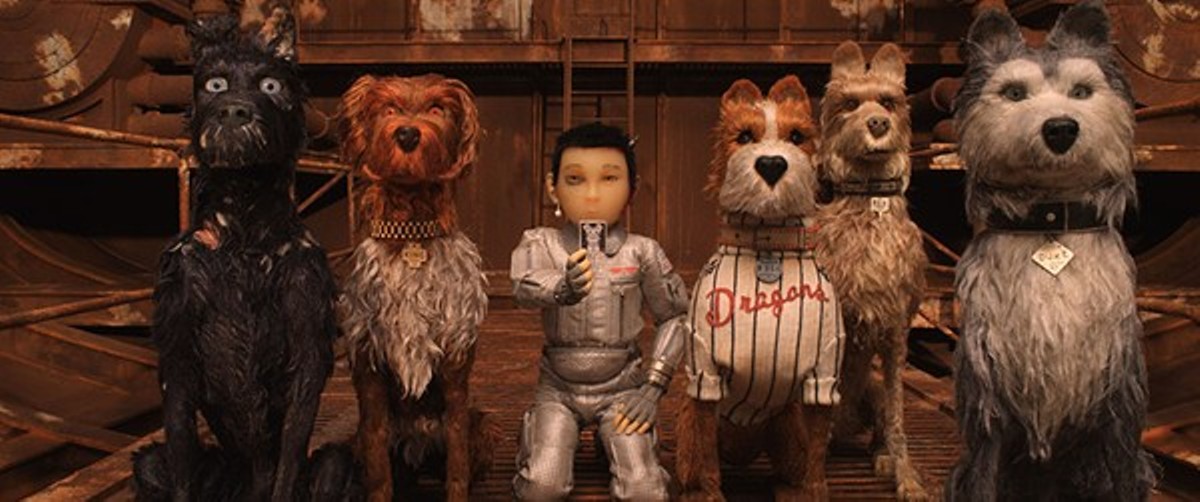Wes Anderson’s 'Isle of Dogs' is delightfully disobedient

Old dog, new tricks, and blind spots.
Courtesy of Fox Searchlight
[
{
"name": "GPT - Leaderboard - Inline - Content",
"component": "35519556",
"insertPoint": "5th",
"startingPoint": "3",
"requiredCountToDisplay": "3",
"maxInsertions": 100
}
]
If you Google “does Wes Anderson hate dogs?” you will find several cinematic examples that might suggest the answer is a resounding “yes.” In The Royal Tenenbaums, the family dog Buckley is killed by a coked-out Owen Wilson. Snoopy meets his demise by means of bow and arrow in Moonrise Kingdom. And Jeff Goldblum’s character in The Life Aquatic with Steve Zissou strikes a three-legged dog with a newspaper, who is later abandoned on an island.
However, if you say the name of his latest film Isle Of Dogs out loud you will find yourself saying what sounds like “I Love Dogs.” One could assume Anderson is marking new-ish territory.
In Isle of Dogs, his second stop-motion animated feature (following 2009’s The Fantastic Mr. Fox), Anderson hardly strays from the meticulous stylistic packaging that have become a hallmark of his films. All of Anderson’s favorite tricks are in play here, from structuring the film into theatrical acts, to compulsive rectangular symmetry, deadpan dialogue, and Bill Murray. Mostly, Isle Of Dogs is a stunning technical and storytelling achievement and could rival Anderson’s best work… well, almost.
Isle Of Dogs is set against the fictional Japanese city of Megasaki, a not-so-distant future dystopia run by corrupt Mayor Kobayashi (voiced by Kunichi Nomura). During his Mayorship, Kobayashi has passed an executive order to exile all dogs, both domestic and stray, to “Trash Island” after a pandemic referred to as “Snout Fever” spreads rapidly. Having made unfounded claims that the disease will spread to humans, Kobayashi, who is up for re-election, faces opposition from “The Science Party,” made up of a group of scientists who have developed the cure to the doggy disease.
“Whatever happened to man’s best friend?” This question is posed early on by candidate Professor Watanabe during a debate.
Enter antagonist and tenacious 12-year-old ward to the Mayor, Atari Kobayashi (Koyu Rankin) who ventures to Trash Island in search of his bodyguard dog, Spots (Liev Schreiber). When his mini-turbo plane makes a crash landing on the doggy-dumping ground, he is befriended by a pack of mutts — Boss (Bill Murray), King (Bob Balaban), Rex (Edward Norton), Duke (Jeff Goldblum), and Chief, voiced by Anderson newbie Bryan Cranston — who embark on a journey to aid Atari in his search for his lost companion.
“I wish somebody spoke his language,” Duke says after meeting Atari, or Little Pilot, as the dogs refer to him.
See, the dogs in Isle Of Dogs speak English. Atari speaks Japanese, and like all of the Japanese characters in the film, is voiced by a Japanese actor. However, subtitles are not provided for these characters, unless Interpreter Nelson (voiced by Frances McDormand) translates breaking news or details during campaign debates, and futuristic technology is used sparingly to translate Japanese dialogue (most notably in the headsets worn by Atari and Spots). We, the English-speaking viewers, are forced to assume what the Japanese characters are saying, relying only on tone, volume, and facial expressions. Because the Japanese characters are essentially rendered foreigners in their own country in the film, some critics, like the Los Angeles Times’ Justin Chang, have accused Anderson of whitewashing Japanese culture.
Isle Of Dogs is not the first time Anderson has fictionalized a real, geographical place, and doused it in his brand of whimsical melancholy. And this isn’t the first time Anderson has faced criticism for whitewashing, either. (The Darjeeling Limited, set in India, faced similar backlash.) It’s hard to overlook things as glaring as the film’s suggested appropriation of Japanese culture, as well as the sexism as illustrated by the only two female canine characters — the prim former show dog Nutmeg (Scarlett Johansson) and Peppermint, whose only role is to breed pups for one of the leads. Perhaps the most problematic character is Tracy Walker (voiced by Greta Gerwig), a blonde-haired American exchange student and editor of The Megasaki Senior High Daily Manifesto who leads the pro-dog student resistance against the Kobayashi agenda. The fact that she is cast as the film’s righteous mouthpiece might be more our problem than Anderson’s.
But Isle Of Dogs is — dare we say — the ultimate underdog tale. A migrant story packaged as a Wes Anderson film, Dogs explores deportation, rigged elections, and fake news with compassion, and in doing so has probed a nuanced conversation about cultural admiration vs. tourism, and the ongoing polarization of Anderson worship. For those looking at the big picture, Isle Of Dogs will likely feel like a reward. For those looking at the smaller one, well, the film may leave you out in the cold. Aside from the gorgeously transfixing puppetry, animation, and textural details, the film’s most universal, inarguable take-away is that sometimes it pays to be a bad dog.





